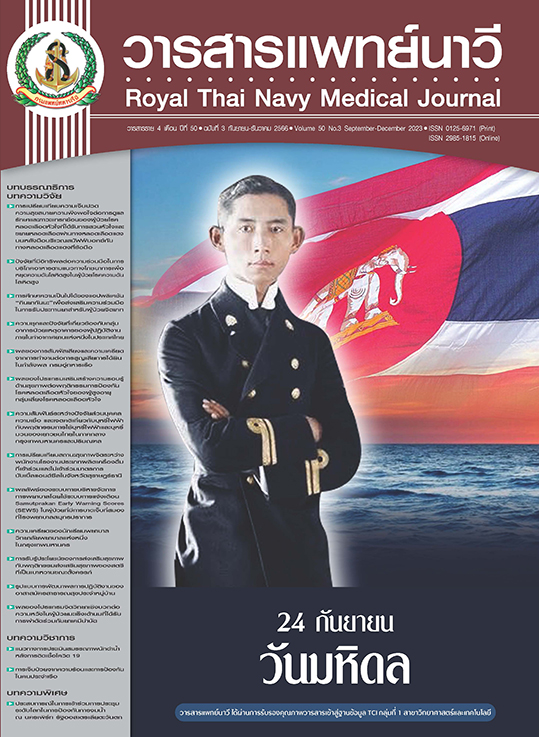Heat-related Illnesses and Prevention among Seafarers
Main Article Content
Abstract
Global climate change has resulted in a rise in global temperatures, leading to an increased incidence of heat-related illnesses especially among workers who work outdoors or exposed to heat sources. Severe symptoms can even lead to fatalities. Common symptoms include excessive sweating, dizziness, and muscle cramps. Several factors contribute to the risk of heat-related illnesses, including personal factors (e.g., age, pre-existing medical condition), behavioral factors (e.g., inadequate hydration, heat acclimatization), and environmental factors. For seafarers whose work involves direct exposure to heat in all departments, the prevalence of heat-related illnesses was reported to be approximately 29%. There was also a correlation between heat and mental stress, particularly in the engine room. The primary prevention method is heat acclimatization, gradually increasing the duration of exposure to heat and most importantly, promoting awareness and providing training are key components. Studies have shown that knowledge about heatstroke still needs improvement. However, a positive attitude, characterized by consciousness and awareness while working in a hot environment, is associated with proper practices. Despite advancements in maritime technology that have improved work safety, uncontrollable environmental factors such as rising global temperatures persist. Therefore, it is crucial to promote awareness, provide knowledge, and emphasize the prevention and proper care of heat-related illnesses to ensure safety during ship operations.
Article Details

This work is licensed under a Creative Commons Attribution-NonCommercial-NoDerivatives 4.0 International License.
References
World Health Organization. Climate change. [Internet]. [cited 2022 October 23]. Available from: https://www.who.int/health-topics/climate-change#tab=tab_1.
Campa Rdl, Bouza MÀ, Louro J. Heat stress on board: risk and prevention. 8th ed. A Coruña, Spain: Department of Nautical Sciences and Marine Engineering School of Nautical Sciences and Marine Engineering; 2020.
Collins KJ, Eddy TP, Lee DE, Swann PG. Nutritional and environmental studies on an ocean-going oil tanker. 1. Thermal environment. Br J Ind Med 1971;28(3):237-45.
Ellis FP. Ecological factors affecting efficiency and health in warships. Br J Ind Med 1960;17(4):318-26.
Oldenburg M, Jensen HJ, Latza U, Baur X. Seafaring stressors aboard merchant and passenger ships. Int J Public Health 2009;54(2):96-105.
Palella BI, Quaranta F, Riccio G. On the management and prevention of heat stress for crews onboard ships. Ocean Engineering 2016;112:277-86.
Pérez JA, Orosa JA, Grueiro T. A three-dimensional CFD simulation study to reduce heat stress in ships. Applied Thermal Engineering 2016;94:413-21.
Wang X, Xia D, Long X, Wang Y, Wu K, Xu S, et al. Knowledge, attitudes, and practices of military personnel regarding heat-related illness risk factors: results of a Chinese cross-sectional study. Front Public Health 2021;9:707264.
Habibi P, Moradi G, Dehghan H, Moradi A, Heydari A. The impacts of climate change on occupational heat strain in outdoor workers: a systematic review. Urban Climate 2021;36(5):100770.
Lee J, Lee YH, Choi WJ, Ham S, Kang SK, Yoon JH, et al. Heat exposure and workers' health: a systematic review. Rev Environ Health 2022;37(1):45-59.
McKillop M, Links JM, Watson CR, Pittluck R, Latshaw MW, Sell TK. Climate change & health assessing state preparedness. Washington DC: Johns Hopkins Bloomber School of Public Health, Trust for America's Health; 2020.
NASA. Global temperature climate change: vital signs of the planet. [Internet]. [cited 2022 October 23]. Available from: https://climate.nasa.gov/.
Health Promotion and Preventive Medicine Division, Royal Thai Army Medical Department. Preventive surveillance and first aid for heat-related illnesses (for medical units). Bangkok: Health Promotion and Preventive Medicine Division; 2012. (in Thai).
Hyland D. Climate change and extreme heat: What you can do to prepare. Atlanta: U.S. Environmental Protection Agency (EPA) and Centers for Disease Control and Preventions (CDC); 2016.
Department of Disease Control of Thailand, Naval Medical Department. Maritime medicine for public health professional. Nonthaburi: Department of Disease Control of Thailand; 2022. (in Thai).
Oldenburg M, Jensen H-J. Stress and strain among seafarers related to the occupational groups. Int J Environ Res Public Health 2019;16(7):1153.
Oldenburg M, Felten C, Hedtmann J, Jensen HJ. Physical influences on seafarers are different during their voyage episodes of port stay, river passage and sea passage: a maritime field study. PLoS One 2020;15(4):e0231309.
Orosa J, Oliveira A. Case study of safe working conditions in Spanish merchant ships. Polish Maritime Research 2012;19(2):43-8.
El-Shafei DA, Bolbol SA, Awad Allah MB, Abdelsalam AE. Exertional heat illness: knowledge and behavior among construction workers. Environ Sci Pollut Res Int 2018;25(32):32269-76.
Mutic AD, Mix JM, Elon L, Mutic NJ, Economos J, Flocks J, et al. Classification of heat-related illness symptoms among Florida farmworkers. J Nurs Scholarsh 2018;50(1):74-82.
Arbury S, Jacklitsch B, Farquah O. Heat illness and death among workers: United State, 2012-2013. Morbidity and Mortality Weekly Report (MMWR) 2014;63(31):661-5.
Ideris ATM, Aris SAM, Jalil SZA, Bani NA, Kaidi HM, Muhtazaruddin MN. Heat exposure assessment among warship technicians in machinery room. Journal of Advanced Research in Occupational Safety and Health 2018;1(1):19-23.
Yooroong A, Meeparn A, Untaja P, Thaiudom A, Ankanawin U, Bohplian S. Factors affected to behavior of Thai army trainers in monitoring and preventing heat related illness among privates trained in the Royal Thai Army. Journal of The Royal Thai Army Nurses 2014;15(1):114-21 (in Thai).
Li J, Xu X, Ding G, Zhao Y, Zhao R, Xue F, et al. A cross-sectional study of heat wave-related knowledge, attitude, and practice among the public in the Licheng district of Jinan city, China. Int J Environ Res Public Health 2016;13(7):648.
Luque JS, Becker A, Bossak BH, Grzywacz JG, Tovar-Aguilar JA, Guo Y. Knowledge and practices to avoid heat-related illness among Hispanic farmworkers along the Florida-Georgia Line. J Agromedicine 2020;25(2):190-200.
Stoecklin-Marois M, Hennessy-Burt T, Mitchell D, Schenker M. Heat-related illness knowledge and practices among California hired farm workers in the MICASA study. Ind Health 2013;51(1):47-55.
Xiang J, Hansen A, Pisaniello D, Bi P. Workers' perceptions of climate change related extreme heat exposure in South Australia: a cross-sectional survey. BMC Public Health 2016;16(1):549.


